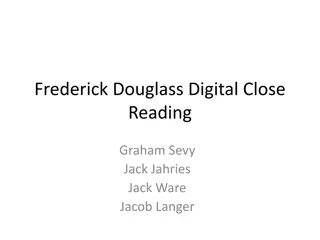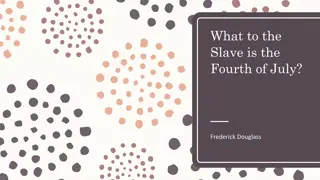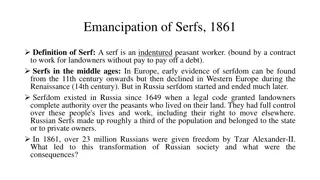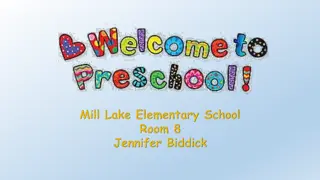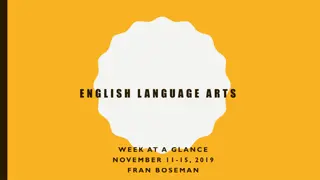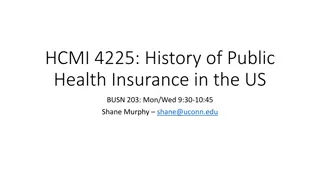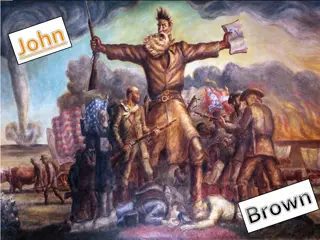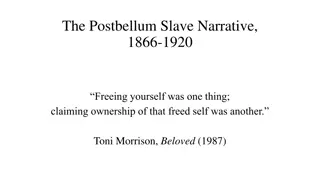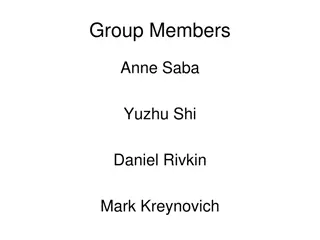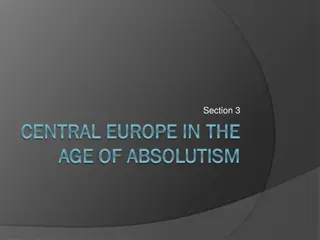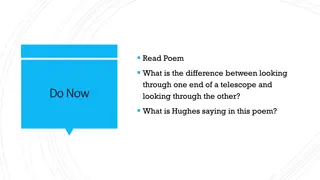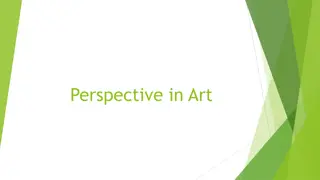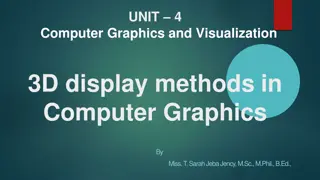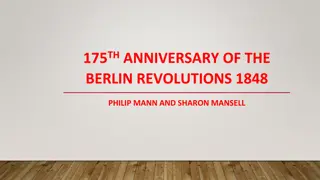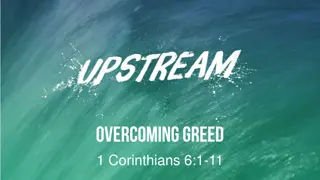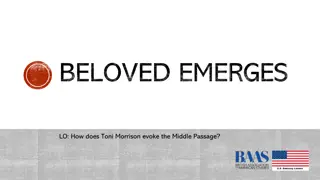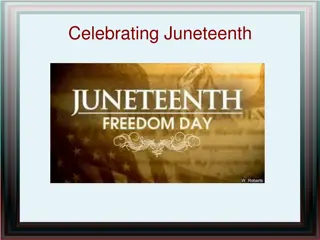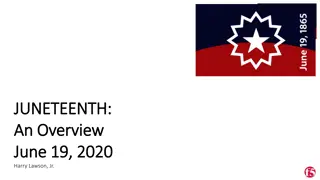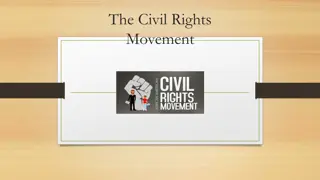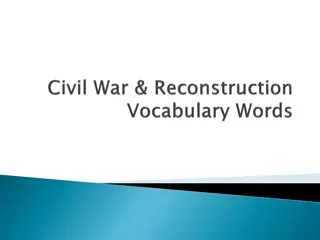Analyzing Frederick Douglass' Perspective on Emancipation Process in the US
Explore Frederick Douglass' critical view on the emancipation of slaves by the US government through Document 2, highlighting the challenges faced by the freedmen and the repercussions of the process. Delve into model answers and scholar insights to comprehend the historical context and complexities of Reconstruction.
Download Presentation

Please find below an Image/Link to download the presentation.
The content on the website is provided AS IS for your information and personal use only. It may not be sold, licensed, or shared on other websites without obtaining consent from the author. Download presentation by click this link. If you encounter any issues during the download, it is possible that the publisher has removed the file from their server.
E N D
Presentation Transcript
Agenda 1. Bellwork: Start reviewing feedback 2. Unpack LT s 3. Review feedback/models 4. Revise and finish gists and answers to questions 5. Planning Page 6. Closure: Warm and cool feedback -Your knowledge of the DBQ process
Learning Target I can use the models and written feedback to reflect on my answers and make revisions to improve the accuracy of my answers (old and new) Language Target: I can incorporate academic vocabulary related to Reconstruction when answering scaffolded document questions.
Re-looking at Document 2 for accuracy . . . History does not furnish an example of emancipation under conditions less friendly to the emancipated class than this American example. Liberty came to the freedmen of the United States not in mercy, but in wrath [anger], not by moral choice but by military necessity, not by the generous action of the people among whom they were to live, and whose good-will was essential to the success of the measure, but by strangers, foreigners, invaders, trespassers, aliens, and enemies. The very manner of their emancipation invited to the heads of the freedmen the bitterest hostility of race and class. They were hated because they had been slaves, hated because they were now free, and hated because of those who had freed them. Nothing was to have been expected other than what has happened, and he is a poor student of the human heart who does not see that the old master class would naturally employ every power and means in their reach to make the great measure of emancipation unsuccessful and utterly odious [hateful]. It was born in the tempest and whirlwind [turmoil] of war, and has lived in a storm of violence and blood... Gist: Gist: ...When the Hebrews were emancipated, they were told to take spoil [goods or property] from the Egyptians. When the serfs of Russia were emancipated [in 1861], they were given three acres of ground upon which they could live and make a living. But not so when our slaves were emancipated. They were sent away empty handed, without money, without friends, and without a foot of land to stand upon. Old and young, sick and well, were turned loose to the open sky, naked to their enemies. The old slave quarter that had before sheltered them and the fields that had yielded them corn were now denied them. The old master class, in its wrath, said, Clear out! The Yankees have freed you, now let them feed and shelter you! . . . - Source: Frederick Douglass, Life and Times of Frederick Douglass, (Park Publishing Co.) 1881
Let's explore model answers for Doc 2, but first... Doc 2 Question According to this document, what did Frederick Douglass identify as a problem with the way the US government emancipated the slaves? What is this question asking you to specifically look for?
Scholar Model 1 Q: According to this document, what did Frederick Douglass identify as a problem with the way the US government emancipated the slaves? A: According to the text it states The old master class, in its wrath, said, Clear Out! The Yankees had freed you, now let them feed and shelter you. What do you think I noticed from this answer?
Scholar Model 2 Q: According to this document, what did Frederick Douglass identify as a problem with the way the US government emancipated the slaves? A: In his book titled Life and Times of Frederick Douglass in 1881, Douglass explains that emancipated slaves had been sent away open handed, without money, without friends, and without a foot of land to stand upon by the US Government. The lack of government support had devastated the economic conditions for the emancipated black community. What do you think I noticed from this answer?
Scholar Model 3 Q: According to this document, what did Frederick Douglass identify as a problem with the way the US government emancipated the slaves? A: Frederick Douglass identified this problem as the way African Americans will get treated once they were emancipated What do you think I noticed from this answer?
Scholar Model 4 Q: According to this document, what did Frederick Douglass identify as a problem with the way the US government emancipated the slaves? A: Frederick Douglass identified as the problem with these way the US Government emancipated the slaves with nothing on there name because they hated them. What do you think I noticed from this answer?
Scholar Model 5 Q: According to this document, what did Frederick Douglass identify as a problem with the way the US government emancipated the slaves? A: Frederick Douglass identified in 1881 that the way the US Government emancipated slaves was not justified because slaves had been set free by the master class with no means to live. No one took responsibility for them to survive after slavery. What do you think I noticed from this answer?
When writing for accuracy, ask yourself each of these questions What is the question asking me to do? Did I answer the question correctly? Did I paraphrase correctly? Did I use a quote from the document? If so, did I explain what the quote meant? Is my answer accurate? Is it clear? Does it make sense?
Planning out your essay-What will you include on it? 1. What the purpose of a planning page? 1. How do you create a compelling claim 1. How do you choose evidence? Is the evidence aligned with the claim? 1. How do you explain the evidence with reasoning a. What is reasoning? Reasoning is a logical, thoughtful way of thinking. When your teacher explains the reasoning behind his classroom rules, he makes it clear exactly why and how he came up with them. 2. What are examples of related outside information?
Model Paragraph with Claim, Evidence, Reasoning, Related outside Information The Civil Rights movement would not have been effective without the use of nonviolent forms of resistance. Rosa Parks helped to end legal segregation by intentionally refusing to give up her seat to a white person on a bus in Montgomery, Alabama (Doc1) Rosa Parks inspired tens of thousands of black citizens to boycott the Montgomery city buses for over a year. During that period she served as a messenger to coordinate rides for protesters and was indicted, along with King and over 80 others, for participation in the boycott.Through her nonviolent actions and arrest, she began the movement to integrate city buses in Montgomery. A few years later, MLK Jr. organized the March on Washington. During this event he delivered his memorable I Have a Dream speech which attracted over 250,000 people. The march was successful in pressuring president John F. Kennedy to initiate a strong federal civil rights bill in Congress.


